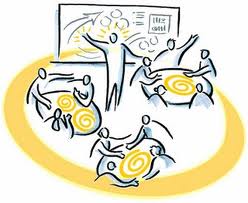ROLES OF A FACILITATOR

An important first step is to understand that facilitation is a type of process-oriented leadership that involves interactions between two or more people.
We call it process-oriented leadership because facilitation is, in part, about understanding, planning and managing process. Process is the “how we are going to do the work” as opposed to “what we are going to work on” which is the content.
Facilitators therefore are engaged in making decisions about what process component and stage to enter as well as the tools that are appropriate for the task and the group at hand.
Facilitation is about taking a leadership role in process and leaving the leadership of content to the individual or group that owns the content (the client).
When people talk or think about the role of a facilitator there are many differing and frequently erroneous perceptions about what that role entails.
Some people think of facilitators only as “super time keepers” handling the task of keeping the meeting or session moving forward in a timely manner.
Others see them as “flip chart secretaries” responsible for recording the information and keeping track of everything that results from the meeting, perhaps even transcribing it. Some people seek out a facilitator because they are looking for a sideline cheerleader as support or someone to do the meeting planning or manage the logistics. Perceptions like this are a result of a misunderstanding or lack of understanding about the essential role of facilitator.
